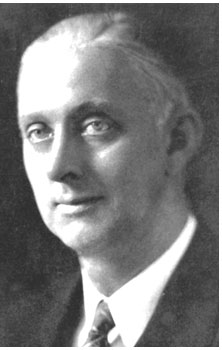
Dr. Wilmon Newell (1878-1943)
Inducted 1966
Highlights
Entomology
Plant Act
State Plant Board
Citrus Canker
Florida Entomological Society
Mediterranean Fruit Fly
University of Florida Experiment Station & Cooperative Extension Service
American Association of Economic Entomologists
Association of Southern Agricultural Workers
Soil Science Society
Florida State Soil Conservation
Florida Land-Use Planning Committee
Advisory Committee on Agriculture
Florida Defense Council
Bio
Wilmon Newell was born in Hull, Iowa, on March 4, 1878. He attended college at Iowa State, where he received his B.S. in 1897. Serving briefly as an assistant in entomology at the Iowa Agricultural Experiment Station, Newell later travelled to Ohio to pursue post-graduate studies at Ohio State, where he received his M.S. Newell again gained employment as an assistant in entomology, this time at the Ohio Agricultural Experimental Station, where he worked from 1899-1902.
In 1902 Newell began a period of frequent travel. He became Associate Entomologist and Apiarist at the Texas Agricultural Experiment Station, where he stayed for a year before moving to Georgia to become the state entomologist in 1903. In 1904 he became entomologist for the State Crop Pest Committee of Louisiana, gaining notoriety for his contributions for controlling the cotton boll weevil. In 1910 Newell returned to Texas, becoming state entomologist for five years.
On May 30, 1915, the Florida Legislature approved the Plant Act, which created the State Plant Board, whose main job was to be the eradication of citrus canker. Already a prominent entomologist, Dr. Newell was brought in to become the first Plant Commissioner of the Florida State Plant Board. Shortly after coming to Florida, Newell helped to establish the Florida Entomological Society, for which he would serve as the first treasurer-secretary in 1916. As leader of the plant board, Newell directed a campaign to eliminate citrus canker, which by the early 1930’s was deemed a success. But in 1929 a new menace threatened the Florida Citrus Industry: the Mediterranean Fruit Fly. At the request of the USDA, Newell directed the state’s first campaign to control the harmful insect. This effort was also deemed a success. Newell’s legacy stemmed from his work in these and other control programs. During his long career he published technical papers on apiculture, cotton insects, scale insects, quarantine programs and procedures, and insect eradication.
Newell had a tremendous zeal for work and an executive ability that led to his selection for numerous positions. He demonstrated this when he was hired in 1921 by the Florida Board of Control to head the University of Florida’s College of Agriculture and its Experiment Station and Cooperative Extension Service. Owing largely in part to Newell’s leadership, the research station rose to a prominent role from the 1920s to the 1940s. In 1938 the post of Provost for Agriculture was created by the Board of Control and given to Newell, who held it until his death in 1943.
As one might expect, Newell compiled a lengthy list of associations. He was a member of the advisory council of the Southern Forestry Service, member and president in 1920 of the American Association of Economic Entomologists. He was a charter member of the cotton states branch of the association, president of the Association of Southern Agricultural Workers in 1929, the University of Florida Representative to the Institute for Research in Tropical America, a member of the Soil Science Society, Administrator of the Florida State Soil Conservation, chairman of Florida Land-Use Planning Committee, chairman of the Advisory Committee on Agriculture, and the Florida Defense Council.
Dr. Newell was known not just for what he produced, but also for the tremendous character he demonstrated. He had a warm personality and was renowned for the way he took interest in the development of young scientists. Many years after he concluded work in Texas, it was revealed that Newell often assisted poor families in the area around College Station. A man who dedicated himself to his craft, Newell said his one regret upon his impending death in 1943 was that he would not be “permitted to do the many other things that I had planned for Florida agriculture and for my associates.”
Newell’s legacy is still recognized on the University of Florida Campus. The Department of Entomology in the College of Agriculture named their professional society after the renowned entomologist. At the direction of Governor Spessard L. Holland, the Agricultural Experiment Station Building was named Newell Hall. Newell was inducted into the Florida Citrus Hall of Fame in 1966.
